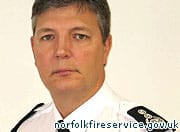A decision by a Norfolk fire chief to ditch Christian prayers during his brigade’s annual Remembrance Day service has been met with astonishment.
Staff at Norfolk Fire and Rescue Service used to hear prayers said by a local chaplain before and after the traditional two minute silence at 11am.
But new chief fire officer Nigel Williams replaced prayers with poetry readings after he was told that some staff were “uncomfortable” with the religious aspects of the service.
Astounded
The move was supported by the National Secular Society (NSS) which is currently suing Bideford Town Council in a bid to ban the tradition of saying prayers at the start of meetings.
Around 40 staff at the Norfolk fire brigade’s headquarters in Hethersett near Norwich gathered to hear a senior fire officer read war poet Laurence Binyon’s famous poem For the Fallen before the silence.
Neil Harvey, a committee member of Norfolk Retained Firefighters’ Union, said: “I’m astounded. The people we’re remembering here don’t want to be anonymous and don’t want their faith to be anonymous.
“That seems to be the way the world is going – making everything vanilla in order to avoid offending anybody.
Tradition
“It would be interesting to find out how many people complained and what those complaints were.
“Is it money well spent for people to sit there and dream up things like this instead of spending it on frontline firefighters and new kit?”
Jenny Simpson of the Norwich Royal British Legion said: “I do not see why they cannot have a religious service.
“It is traditional to hold a religious service at the same time as the two minutes silence.”
Sidelined
Terry Sanderson, President of the NSS, called for the secularisation of Remembrance Day services, insisting: “It’s time for the vicars to stand aside and for new, non-religious events to be introduced.”
Attempts to stop councils from holding prayers at their meetings have been blasted by the Mayor of London Boris Johnson, the Communities Secretary Eric Pickles and the former Archbishop of Canterbury Lord Carey.
Misguided
Boris Johnson pointed out that Parliament has the same tradition, and that it is helpful for both believers and non-believers.
Speaking to Premier Christian Radio, the Mayor said: “Whatever they may think about the existence or non existence of God or whatever, it’s quite a good thing that they should focus briefly in a moment of prayer, which is a unique period of reflection”.
He added that any attempts to ban the practice would be “misguided”.
Freedom
At the beginning of June Communities Secretary Eric Pickles said councils should continue to have the freedom to pray at their meetings.
While making clear he was not speaking about a particular case, Mr Pickles said: “Prayers are an important part of the religious and cultural fabric of the British nation.”
“While the decision on whether to hold prayers is a matter for local councils, I want to ensure that they continue to have the freedom to do so”, he added.
Attack
In May Lord Carey hit out at the NSS campaign.
He said: “The attempt to rule such prayers as discriminatory is an attack on freedom and a cynical manoeuvre to drive public expressions of faith from national as well as local life.”
Bideford councillor Tony Inch fears the town council is being targeted because it doesn’t have adequate resources to fund a robust legal defence.
Mr Inch warned: “They are trying to use us as a test case”.
Privatise
In 2008 Bideford Council faced bringing to an end its tradition of praying before meetings when a Liberal Democrat councillor proposed to ban the practice.
The Council was then given incorrect advice that their prayers infringed human rights laws.
Conservative MP for the area, Geoffrey Cox, criticised the advice at the time calling it “proof of a disturbing tendency to try to use spurious legal arguments under the Human Rights Act and equality legislation to eliminate the Christian faith from the fabric of our public life”.

